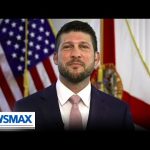President Trump treated the nation to a take-no-prisoners interview on 60 Minutes that reminded Americans what real negotiation looks like. The sit-down, taped at Mar‑a‑Lago and aired on November 2, showcased Trump’s blunt, results-driven style while provoking predictable outrage from coastal elites who prefer talk over action. CBS ran a condensed broadcast and later released an extended cut, underscoring that Trump still controls the media moment when he chooses to.
On China and Taiwan, Trump was unapologetically tough, saying Chinese leader Xi Jinping and his team “know the consequences” of military action and asserting he’s been clear about U.S. resolve. He even claimed — plainly and without hedging — that Chinese officials have indicated they wouldn’t move while he’s president, a kind of deterrence by reputation few in Washington can match. Democrats and the legacy media pretended to be surprised, but the truth is strength and clarity are exactly what keeps crises from becoming catastrophes.
When pressed about specifics, Trump refused to play the press’s game of revealing military plans, flatly saying “I can’t give away my secrets” and that Taiwan “never even came up” in his recent talks with Xi. That refusal to grandstand while signaling capability is classic statecraft — you deter by being credible, not by live-tweeting troop movements. The extended transcript shows he repeatedly prioritized prudence over photo-ops, something too many career politicians confuse with weakness.
On immigration enforcement, Trump didn’t flinch, defending ICE actions and even saying raids “haven’t gone far enough” as he argued the rule of law must come before feelings. Liberals attacked the imagery, but the administration’s point — that illegal entry cannot be normalized — is a basic premise of national sovereignty the left wants to erase. The interview also highlighted his willingness to confront inconvenient facts head-on, even when they expose the failures of open‑border policies championed by urban elites.
Regarding the government shutdown, Trump put the blame squarely on Democrats and vowed not to be extorted into surrendering conservative priorities just to reopen the doors of government. He even floated drastic options like abolishing the filibuster rather than caving to demands that reward obstruction and ransom the country’s fiscal health. This posture signals that he will prioritize principle and leverage over the Washington habit of permanent compromise that leaves taxpayers on the hook.
The interview didn’t dodge controversy, from his pardon of a crypto executive to questions about pay‑for‑play allegations, but Trump framed those moves as part of a broader fight to keep innovation from fleeing to China. Call it rough around the edges if you like, but in the face of global competitors who have no qualms about stealing American advantage, a president who mixes dealmaking with protectionism is exactly what industries need. The media’s spin machine will nitpick, but voters can see the larger picture: economic strength depends on leadership that actually protects American interests.
America doesn’t need more punditry about process — it needs outcomes that secure our borders, protect our economy, and preserve peace through strength. Trump’s 60 Minutes appearance was less about pleasing the press and more about showing a readiness to defend the nation’s interests, inside negotiations and out. For patriots tired of soft leadership and soft borders, this wasn’t just an interview; it was a promise to restore American power and common sense to the center of policy.




